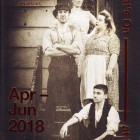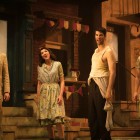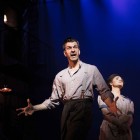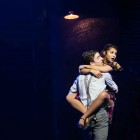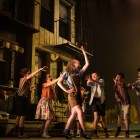Street Scene 2018Royal Conservatoire of Scotland
Read more about the opera Street Scene
The first thing that can be said of this superb enterprise is that any audience member unaware of where they were could hardly have guessed they were watching a performance by students. Taken on every level, this was a production of tremendous quality, meticulously coached, and showing a sense of real dedication and enthusiasm from all the participants. This was a joint effort by nearly all the sections of the Conservatoire. There was an orchestra of forty-two and a chorus of twenty-four (thoroughly drilled by James Slimings), eight children (trained by Andrew Nunn) and a long list of solo roles, including music-theatre performers.
The families in the brownstone block are all cleverly differentiated - the names indicate origin (Carl and Olga Olsen; Lippo and Greta Fiorentino; Laura Hildebrand; George and Emma Jones; Abraham Kaplan; Daniel Buchanan; Frank and Anna Maurrant) while accents further differentiate between recent arrivals and second or third generation. They vary from elderly immigrant with Americanised children (Kaplan); single mother with school-age children abandoned by father (Hildebrand); recent immigrant couples with new babies (Olsen and Buchanan); Americanised couples with adolescent, trouble-making children (Jones and Maurrant). The depth of characterisation provides endless fascination.
As events unfold, the Hildebrands are evicted by the landlord and disappear, not before announcing that Jenny has received a scholarship and has prospects. Mrs Jones is bitchily critical of Anna's behaviour and of the negligent way in which the Maurrant children have been brought up - entirely reasonable until we get the opportunity to observe the ghastly Jones offspring themselves. The microcosm of life in the block where nothing happens in private is depicted in sometimes gruesome detail.
The production by Alexandra Spencer-Jones, in designs by Adrian Linford, was hugely effective in drawing interpretations from all her performers. There are two central relationships. In the Maurrant household, Frank (Pedro Ometto) is shown as a domestic tyrant alienating his wife and both children, only gaining a slight measure of sympathy when he understands his own faults and accepts his inevitable execution. His wife Anna (Emma Mockett) remains sympathetic, is clearly lonely, more isolated from the social group of the other women, desperate to get the best for her children without the means to achieve it. Rose (Rebecca Godley) is stuck in a dead-end job, fighting off inappropriate advances from her boss, Harry Easter, while trying to advance a relationship with Sam Kaplan (Thomas Kinch), a law student who loves her, but whose elder sister sees his future prospects as the only way to advance the family, as she is stuck looking after dad (a dyed-in-the-wool Marxist whose endless rants bore everyone rigid). With very economical means the script reveals the fragility of success, how easily some people go on the slide as others manage to succeed.
There are several characters who appear briefly, make an impression, then fade out, sometimes returning. The janitor, Henry Davis, has the first solo spot, a Gershwinian number reminiscent of Porgy and Bess, and he was portrayed with sympathetic dependability by Arthur Bruce. The lecherous Harry Easter, planning to set Rose up in a flat, was played by Colin Murray, who put across 'Wouldn't you like to be on Broadway' seductively. Seumas Begg managed not to overexaggerate his Italian characterisation, leading off the Ice Cream Sextet.
Joanna Harries capably led the trio of school graduates celebrating the award of diplomas 'Wrapped in a ribbon, tied up in a bow'. A last note of comedy was provided by the pair of rubber-necking nursemaids with their enormous baby carriages.
This event was given a justifiably rousing reception by the packed audience in the New Athenaeum. Most of them were too young to have seen Scottish Opera's memorable staging in 1989, and it is to be hoped that this superb twentieth century masterpiece will reappear more frequently. Perhaps student productions could be the way forward.
Performance Cast
- Abraham Kaplan
- Greta Fiorentino
- Carl Olsen
- Emma Jones
- Olga Olsen
- Shirley Kaplan
- Henry Davis the janitor
- Willie Maurrant
- Anna Maurrant
- Sam Kaplan
- Daniel Buchanan
- Frank Maurrant
- George Jones
- Steve Sankey
- Lippo Fiorentino
- Jennie Hildebrand
- Second Graduate
- Third Graduate
- Mrs Laura Hildebrand
- Rose Maurrant
- Harry Easter
- Mae Jones
- Dick McGann
- Vincent Jones
- Dr John Wilson
- Officer Harry Murphy a policeman
- City Marshall James Henry
- Fred Cullen Marshall's assistant
- First Nursemaid
- Second Nursemaid
